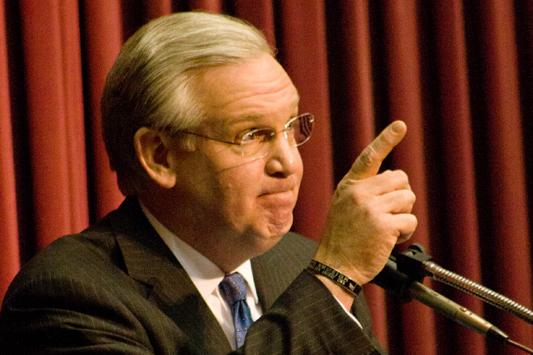Gov. Jay Nixon slashed nearly $9 million from higher education from the $24 billion budget for Missouri’s next fiscal year.
Nixon cited concerns about low state revenues, like those from the Missouri State Lottery, as reasoning for the cuts.
“Cuts are needed — it’s the harsh reality,” said Brian Long, Council on Higher Education in Missouri director. “It’s part of a really difficult situation.”
Because some feel universities have alternate methods of revenue, their budgets are often cut in troubling times, Long said. Higher education was not the only area to take cuts – social programs will also be affected.
Each university will have to cope with the cuts, Long said.
“It’ll be variable — every public university is grappling with lower budgets,” Long said. “They’re employing less staff, there are low or no raises for staff and faculty and there’s reduced maintenance.”
The cuts pushed universities to adopt a business-like way of approaching budgets, Long said. They would have to decide to either do less or do better and consider alternative methods of educating as well as gaining revenue.
This is the third year in a row in which higher education has taken severe cuts, placing Missouri 45th in the nation for higher education funding. But past cuts have not gone unnoticed. The Missouri Students Association started the More for Less campaign last academic year. The campaign culminated with a letter-writing campaign that sent more than 6,000 letters to members of Missouri’s government, including every member of the legislative branch.
“Gov. Nixon’s withholding represents just a tiny fraction of the originally-proposed 12.5 percent cut for higher education in Missouri,” Zach Toombs, MSA Director of Communications and former Maneater staffer, said in an email. “This is a huge legislative win for students, and students’ vocal presence in lobbying for our own interests will have effects on lawmakers’ decisions for years to come.”
Toombs, creator and co-director of the More for Less campaign, said Nixon’s cuts are a signal to students they can — and should — give input on issues at the state level.
“If it wasn’t for the passion and knowledge students showed in fighting for their interests at the state level, the university could have faced a financial disaster — that’s been averted, for this year at least,” he said.
MU has alternate methods of gaining revenue, Toombs also said. MSA passed a bill last February in support of raising cigarette taxes.
Another possible method often discussed is an increase in tuition, which the More for Less campaign advocates to prevent.
“The university is an efficient institution,” Toombs said. “And our leaders at the UM System and MU administrative level should be able to handle a withholding of this size without hurting the student experience at Mizzou.”








